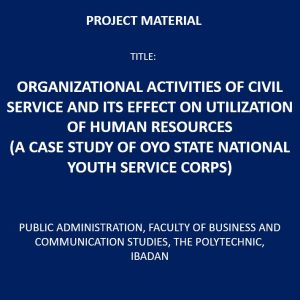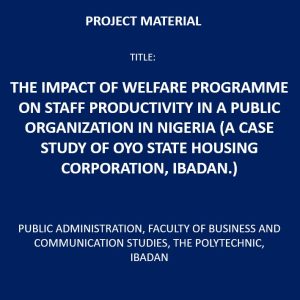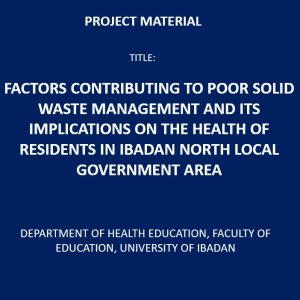No products in the cart.
Security Challenges and Elections in Nigeria
₦10,150.00
SECURITY CHALLENGES AND ELECTIONS IN NIGERIA
- CASE STUDY: A CASE STUDY OF 2019 GOVERNORSHIP ELECTION IN OYO STATE
- NUMBER OF PAGES: 49
- FILE TYPE: DOC - CHAPTER 1-5
- DEGREE: HND
- DEPARTMENT: DEPARTMENT OF PUBLIC ADMINISTRATION, POLYTECHNIC, IBADAN
Background to the Study
Worldwide, election constitutes an important element of democratic governance, remains the mechanism and process through which the consent of the electorate is sought in regards to choosing elected representatives or leaders (Olutola, 2019). However, in many African countries, with particular reference to Nigeria, the conduct of elections by its nature is confrontational and therefore, requires the assurance of equitable security to guarantee participants’ confidence and commitment (Attoh, 2016). Hence, security is integral to the success of the electoral process. Evidence from the United Nations report has shown that on a global scale, one in every five elections experiences some measure of violence (USAID, 2013) and this makes security of the electoral process an imperative, especially in emerging democracies.
Elections are complex set of activities with different variables that act and feed on one another. It can be defined as a ‘formal’ act of collective decision that occurs in a stream of connected antecedent and subsequent behaviour. It involves the participation of the people in the act of electing their leaders and their participation in governance. Elections are not necessarily about Election Day activities, although it forms an important component. It encompasses activities before, during and after elections. It includes the legal and constitutional framework of elections; the registration of political parties, party campaigns, the activities of the security agencies and the government in power. It includes the authenticity and genuineness of the voter’s register. It includes the independence or lack of it, of the electoral agencies and organs. It includes the liberalism or otherwise of political processes in the country and the independence of the adjudicating bodies in elections. (AbdulHammed, 2013)
In Nigeria, the conduct of elections over time has been marred by act of lawlessness, impunity, killings, assassination and wanton destruction of lives and properties (Afolabi, 2018) and thus resulting in increasing voters’ apathy and disenchantment with the conduct of elections in Nigeria, thereby putting into questioning, the preparation and efficiency of the Independent National Electoral Commission (INEC), to organize and conduct credible elections (Afolabi 2014). Also, electoral irregularities such as stuffing and snatching of ballot boxes; rigging of votes, multiple and underage voting; unauthorized and false declaration of results, political thuggery and brigandage, intimidation and harassment of voters among other abuses are witnessed in the conduct of elections in Nigeria and this often breed electoral violence (Oni, Chidozie &Agbude 2013).
In addition, the electioneering campaigns, party rallies, conduct of party primaries and even party meetings often degenerate into chaos thus bringing to the fore the need to secure the electoral process if democracy is to be sustained. Therefore, the persistent incidents of electoral violence and insecurity that usually characterize the conduct of elections in Nigeria have brought to the fore the call for reconsideration of security during elections, implying securing elections to make it credible, free, fair and violent-free (Afolabi, 2017).
It has also led to increasing deployment of different kinds of security personnel for the conduct of elections for all levels of governmental posts. Thus, the security of elections comes up at all stages of the electoral process that is, the pre-electoral, electoral and post-electoral phases (Hounkpe and Gueye, 2010). The deployment of security personnel is based on the imperative to conduct violent free and credible elections in Nigeria. This often implies the provision of adequate security for the movement of electoral materials, deployment of staff, the manning of the polling booths, protection of voters at the polling booths, the safety of the candidates, the party agents and even the media that cover the election, movement of cast ballots to collation centres and the collation of results. (Afolabi, 2018). Invariably, adequate security enhances the free movement of staff, voters, candidates, observers and other stakeholders thus ensuring the credibility of the process, which is critical to the democratic survival in Nigeria. Thus, it is based on this note that this study intends to examine security challenges and elections in Nigeria.






